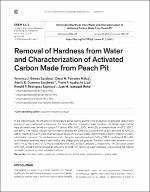Removal of Hardness from Water and Characterization of Activated Carbon Made from Peach Pit

View/
Author(s)
Gómez Zavaleta, Veronica Jhossellin
Terrones Malca, Deysi Marimar
Guerrero Escobedo, Adolfo Enrique
Azabache Liza, Yrwin Francisco
Rodriguez Espinoza, Ronald Fernando
Ipanaqué Roña, Juan Manuel
Date
2025-06-20Metadata
Show full item recordPublisher
EREM ktu
Journal
Environmental Research Engineering and Management
Abstract
In the present study, the influence of temperature and activating agents in the production of activated carbon from peach pits was evaluated to determine the most effective removal of water hardness. To obtain experimental data, activation was carried out using a 1:1 ratio of KOH, H3PO4, ZnCl2, and H2SO4 at temperatures of 400°C, 500°C, and 600°C. The results indicate that the highest preparation yield was achieved with carbon activated by H3PO4 at 400°C, resulting in a 47% yield. In all activation cases, the surface acidity, determined by Boehm titration, exceeded the basic character. The predominant acidic character was obtained with ZnCl2 at 500°C, reaching 62.08 mol%; acid character analyses were supported by zero-charge point pH analysis. The best iodine index analysis results were 797.22 mg/g and 747.72 mg/g, obtained with ZnCl2 at 400°C and 600°C, respectively. The activated carbon with ZnCl2 at 400°C demonstrated an efficiency of 66.88 % in removing water hardness, representing the highest removal compared to other activated carbons.
Type
info:eu-repo/semantics/article
Rights
info:eu-repo/semantics/openAccess
Language
eng
Collections
- Ingeniería Ambiental [98]

